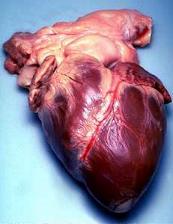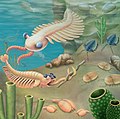Wikijunior:Biology/Organs
Organs
[edit | edit source]

Many living things have organs. Your heart, brain, lungs, liver, and kidneys are all examples of organs.
Organs are made up of two or more tissues.
All organs have something that they do to keep you healthy. For example, the heart pumps blood, and the lungs give you air.
Organs work together in groups called organ systems.
Cambrian explosion and organ formation
[edit | edit source]The earth formed about 4.5 billion years ago. One billion years later, at the latest, there were unicellular organisms. Complex single-celled organisms, called eukaryotes, arose about 2 billion years ago. The first multicellular organisms, such as filamentous algae, jellyfish and worms, arose 1-2 billion years ago.
Around 540 million years ago, animals with complex organs such as hearts and eyes emerged. Just as the economy and way of life of people fundamentally changed in the industrial revolution in a short historical time, all animal tribes that exist today have developed in a geologically short time. Biologists speak of the Cambrian explosion. The industrial revolution was triggered by basic innovations such as the steam engine. The Cambrian explosion was also probably triggered by basic innovations that made organ formation possible. The prerequisite is that cells specialize and then migrate to the right place.






